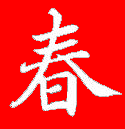|
|
 |
|
About Chinese New Year
|
|
|
Chinese New Year (Traditional Chinese: 春節, or 农历新年, Simplified Chinese: 春節, or 农历新年; pinyin: chūnjié, or nónglì xīnnián), also known as the Lunar New Year or the Spring Festival is the most important of the traditional Chinese holidays. It consists of a period of celebrations, starting on New Year's Day, celebrated on the first day of the first month of the Chinese calendar. This is the day of the second new moon after the winter solstice, unless there is an intercalary eleventh or twelfth month in the lead-up to the New Year. In such a case, the New Year falls on the day of the third new moon after the solstice. (The next time this occurs is in 2033.) The Chinese New Year period ends with the Lantern Festival, on the fifteenth day of the festival.
According to legend, the beginning of the year began with month 1 during the Xia Dynasty, month 12 during the Shang Dynasty, and month 11 during the Zhou Dynasty, but intercalary months were added after month 12 during both the Shang Dynasty according to surviving oracle bones and the Zhou Dynasty according to Sima Qian. The first Emperor of China Qin Shi Huang changed the beginning of the year to month 10 in 221 BC. Whether the New Year was celebrated at the beginning of these months or at the beginning of month 1 or both is unknown. In 104 BC, Emperor Wu established month 1 as the beginning of the year where it remains.
According to legend, in ancient China, Nian ("Nyan"), a man-eating predatory beast from the mountains, could infiltrate houses silently. The Chinese were always very scared of this monster. The Chinese later learned that Nian was sensitive to loud noises and the color red, and so they scared it away with explosions, fireworks and the liberal use of the color red. So "GuoNian" actually means "Passover the Nian". These customs led to the first New Year celebrations.
Another popular legend is about Chinese New Year Eve, which is called "ChuXi" or 除夕 in Mandarin Chinese. "Chu" means "get rid of" and "Xi" is the name of a legendary man-eating beast that preys once a year on New Year Eve. When Xi arrived, people use firecrackers to scare Xi away. Once Xi ran away, people joined together to celebrate for another year of safe life.
Celebrated internationally in areas with large populations of ethnic Chinese, Chinese New Year is considered to be a major holiday for the Chinese as well as ethnic groups such as the Mongolians, Koreans, the Miao (Chinese Hmong), the Vietnamese (see Tết), Tibetans, the Nepalese and the Bhutanese (see Losar) who were strongly influenced by Chinese culture in terms of philosophical and religious worldview, language and culture in general. Chinese New Year is also the time when the largest human migration takes place when overseas Chinese all around the world return home on the eve of Chinese New Year to have reunion dinners with their families.
|
|

